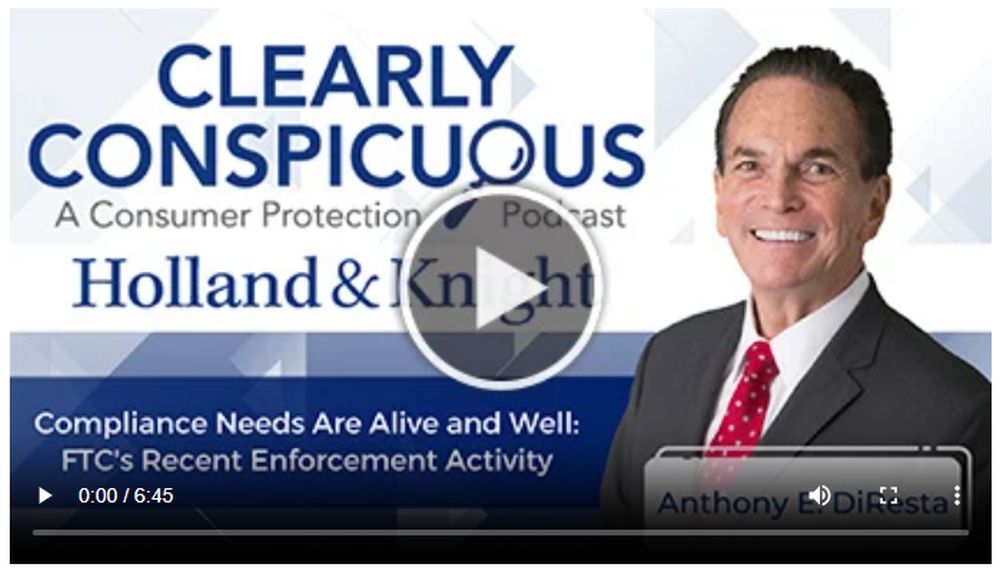In this episode of "Clearly Conspicuous," consumer protection attorney Anthony DiResta provides an early analysis of the Federal Trade Commission's (FTC) direction under Chair Andrew Ferguson, emphasizing that the agency is intensifying, not scaling back, its enforcement efforts despite broader deregulatory trends. Mr. DiResta examines recent FTC actions that span multiple sectors, including holding a workshop on the technology industry's impact on families, issuing new rules against deceptive pricing, targeting business scams and increasing scrutiny on artificial intelligence (AI) product claims. This episode highlights the FTC's multi-agency collaboration and suggests that, although enforcement may become more selective, the focus will be on precedent-setting cases. Mr. DiResta cautions companies to not interpret deregulatory rhetoric as a relaxation of compliance expectations and instead understand that the need for robust, well-documented and proactive compliance measures has never been greater.
Listen to more episodes of Clearly Conspicuous here.
Podcast Transcript
Good day and welcome to another podcast of Clearly Conspicuous. As we noted in previous sessions, our goal in these podcasts is to make you succeed in this current environment, make you aware of what's going on with the federal and state consumer protection agencies and give you practical tips for success. As always, it's a privilege to be with you today.
Today we provide a preliminary look at the direction of the Federal Trade Commission (FTC) under its Chair Andrew Ferguson. For several sessions, I've been talking about a new chapter at the FTC under Chair Andrew Ferguson. But, here's the key message upfront: While deregulation and diminishing governmental resources may be a political agenda, the FTC is showing no signs of retreat in its enforcement mission.
Let's begin by summarizing some key actions taken by the FTC very recently, which highlight several industries, including tech, healthcare, financial services and advertising.
- First, the FTC will hold a workshop entitled "The Attention Economy: How Big Tech Firms Exploit Children and Hurt Families" on June 4.
- Next, the Federal Trade Commission and the Department of Justice Antitrust Division issued a joint letter directing the heads of agencies across the federal government to create a list of anticompetitive regulations that reduce competition, entrepreneurship and innovation. The press release says it is designed to advance President Trump's Executive Order on Reducing Anticompetitive Regulatory Barriers.
- Then, there's the Rule on Unfair or Deceptive Fees, which just took effect. The rule prohibits bait-and-switch pricing and other tactics used to hide total prices and mislead people about fees in the live-event ticketing and short-term lodging industries. These unfair and deceptive pricing practices can harm consumers and undercut businesses trying to compete fairly on price. The rule also furthers President Trump's Executive Order on Combating Unfair Practices in the Live Entertainment Market by ensuring price transparency at all stages of the live-event ticket purchase process, including the secondary ticketing market.
- Then, the FTC issued a ban on a company and individual from engaging in debt collection.
- There's more, the Federal Trade Commission and the State of Nevada took action to stop a wide-ranging investment training and business venture scam that billed consumers out of more than $1.2 billion.
- The FTC issued a proposed order requiring Workado LLC to stop advertising the accuracy of its artificial intelligence (AI) detection products unless it maintains competent and reliable evidence showing those products are as accurate as claimed.
This sure doesn't sound like slowing down to me. And, I note the collaboration with state attorneys general and international bodies suggesting multi-front scrutiny. Frankly speaking, notwithstanding the current political environment, we must recognize Chairman Ferguson's legal pedigree and strategic approach, steeped in constitutional, administrative and appellate law. There well might be fewer but more impactful cases with stronger precedent-setting power. Thus, simply put, the FTC is not in a retreat mode — it's in a refinement mode. So here's the compliance message: This is not the time to relax or retreat.
I say all of this to warn against misreading deregulatory rhetoric as permission to cut corners. FTC's activity is not slowing, and the agency is demanding proof of effective compliance, not just paper policies. Companies should treat FTC scrutiny like a regulatory audit: proactive, documented and embedded into daily operations.
So let me provide some practical guidance in strengthening your compliance framework.
- We can expect that the FTC will look at board-level accountability. The FTC is watching whether senior leadership is engaged in oversight.
- Data governance and privacy are critical hot-button issues.
- With respect to advertising and marketing claims, precision and substantiation are non-negotiable.
- AI and algorithmic transparency is a fast-emerging area of interest.
- I encourage regular training, internal audits and responsive compliance culture.
Concluding Thoughts
So here's the key takeaway: Chair Ferguson's FTC is not backing down, it is recalibrating for more strategic impact. Companies that view compliance as a competitive advantage will thrive; those who don't may face significant exposure. Compliance is not just a checkbox, it's your brand's best defense.
Stay tuned to further programs as we identify and address the key issues and developments, and provide strategies for success. I wish you continued success and a meaningful day.
The content of this article is intended to provide a general guide to the subject matter. Specialist advice should be sought about your specific circumstances.


